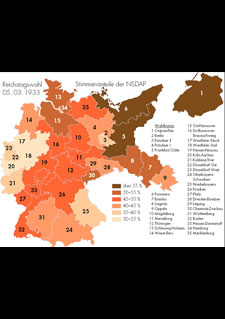The Reichstag Election in March of 1933
Although the different parties still participated in the Reichstag election on March 5, 1933, the election as such was already no longer free. Immediately after the fire in the Reichstag building in Berlin, fundamental basic rights had been suspended by means of the “Reichstag Fire Decree” of February 28, 1933. Communists and Social Democrats in particular became victims of the Nazi terror. Their election campaign was hampered severely.
While these conditions enabled the NSDAP to increase its percentage of votes from 10.8 % to 43.8 % (= 288 of 647 seats) over the election of November 1932, it fell short of the goal of the absolute majority it aspired to. The severely hard pressed KPD lost 4.6 %, winning 12.3 % of the votes (= 81 seats). The losses among all of the other parties stayed within limits (between 0.1 % and 2.1 %). The second strongest party after the NSDAP was the SPD with 18.3 % (= 120 seats). The Catholic Center Party received 11.3 % of the votes (= 73 seats), the right-wing conservative Kampffront Schwarz-Weiß-Rot, which had evolved from the DNVP, the Stahlhelm and the Landbund, won 8 % (= 52 seats). Six other parties received less than 3 %, apiece but were nonetheless able to send representatives (1 to 19 apiece) to the new Reichstag because there was no election threshold.
NSDAP strongholds were located in the eastern, predominantly Protestant part of Prussia. The NSDAP also became the strongest party everywhere except for the traditionally Catholic electoral districts of Cologne-Aachen und Koblenz-Trier where the Center was dominant. The KPD’s eighty-one seats were declared invalid even before the new Reichstag had been constituted. The NSDAP thus attained an absolute majority of seats in the new Reichstag after all.
On March 23, 1933, the Reichstag passed the so-called “Enabling Act” with the necessary two-thirds majority. It abolished the separation of power between the legislative and executive branches. Thenceforth, the Nazi government was able to pass laws without the Reichstag having to decide on them. Apart from the SPD delegates, every member of the Reichstag, even those who were not members of the NSDAP, voted for the Enabling Act, thus effectively burying the parliamentary system in Germany. Every political party except for the NSDAP was banned or disbanded itself in the ensuing months. Members of the right-wing parties were partly given the opportunity to join the NSDAP.

